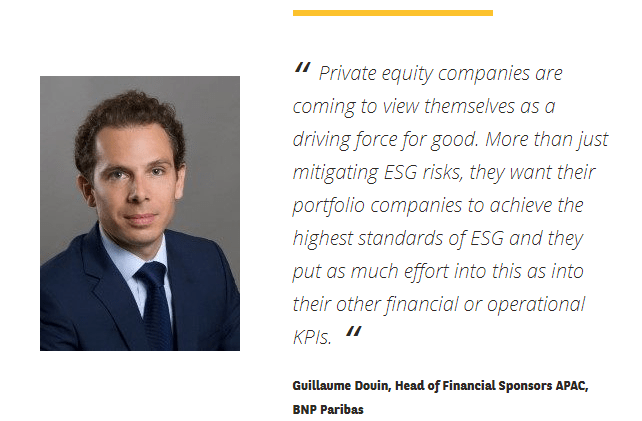Baring Private Equity Asia (BPEA)’s landmark US$3.2bn sustainability-linked loan is the largest and first of its kind in Asia.
The growing urgency of the climate crisis has put the spotlight on the role of investors in driving the transition to a greener and fairer society. While ESG funds have exploded in recent years, the private equity industry is still considered a laggard: in 2020, Institutional Investor reported that only 703 of the world’s 8,810 private equity firms have signed the Principles for Responsible Investment (BPEA is among the signatories).
Leading firms, however, are recognising the potential of embedding ESG principles to enhance the value of their portfolio investments. BNP Paribas’ ESG Global Survey 2021 revealed growing interest among alternative asset classes, with 38% of private equity/debt investors now incorporating ESG considerations in their investments.
BPEA, one of the largest private alternative investment firms in Asia, with US$37bn in assets under management, recently secured a landmark sustainability-linked credit facility, with BNP Paribas as joint lead sustainability structuring advisor on the transaction. The US$3.2bn loan, with initial commitments of approximately US$1.5bn, is the largest-ever sustainability-linked loan (SLL) for a private equity fund in Asia, and one of the largest globally.
Unlike some SLLs, which focus on delivering or maintaining a defined green project, the facility aims to incentivise the implementation of environmental, social and governance principles throughout BPEA’s investment cycle.

“Private equity companies are coming to view themselves as a driving force for good,” said Guillaume Douin, Head of Financial Sponsors APAC at BNP Paribas. “More than just mitigating ESG risks, they want their portfolio companies to achieve the highest standards of ESG and they put as much effort into this as into their other financial or operational KPIs.”
Setting tangible targets
The SLL aligns with the Asia Pacific Loan Market Association’s Sustainability Linked Loan Principles by defining a range of Sustainability Performance Targets (SPTs), focusing in particular on gender diversity and climate change.
“The SPTs incentivise ESG integration throughout the whole investment process,” said Noemie Peiffer, Head of Sustainable Finance, Capital Markets Group, Global Banking Asia Pacific at BNP Paribas. “Pre-investment, the SPTs promote looking at potential portfolio companies through the lens of their ESG risks – and opportunities.
“Once the investment decision is made, the SPTs directly influence the portfolio companies to reduce greenhouse gas emissions and improve diversity within the company’s leadership,” Peiffer continued. “BPEA is also targeting the implementation of a climate strategy at firm level, reflecting its holistic approach taken at all levels of the organisation.”
BPEA has built a dedicated team to monitor portfolio companies’ progress towards their ESG goals and ensures transparency by reporting on progress towards these targets. While the companies must drive change within their own operations, as an active owner, BPEA has full decision-making power.
A strategic driver
If BPEA and its portfolio companies achieve the defined SPTs, the margin of the SLL is reduced, creating a financial incentive to drive ESG performance.
“Aligning the cost of capital with the ESG targets is one more way for BPEA to create value,” said Douin. “When it sells the business in four to five years’ time, having best-in-class standards will help generate a premium. It’s something buyers consider important.”
The potential of ESG to enhance valuations means it is now a major strategic consideration for BPEA, and the firm’s ESG ethos is driven by the senior leadership with buy-in across the entire company. BPEA has also hired dedicated ESG personnel to support pre-investment due diligence and ongoing monitoring.
“This landmark debt facility allows us to set clear benchmarks for climate change and diversity in our portfolio companies, which provides extra motivation to drive real ESG improvements,” said Salata. “We want to set a standard for private equity investors to emulate, which will help embed sustainability in the broader economy, both in Asia and globally.”

